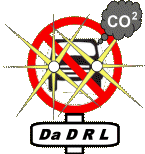|
Extracts from
the
UK
Highway Code
Lighting requirements (113-116)
113 You MUST
- ensure all sidelights and
rear registration plate lights are lit between sunset and
sunrise
- use headlights at night,
except on a road which has lit street lighting. These roads
are generally restricted to a speed limit of 30 mph (48
km/h) unless otherwise specified
- use headlights when
visibility is seriously reduced (see Rule 226)
Night (the hours of darkness) is
defined as the period between half an hour after sunset and half
an hour before sunrise).
[Laws RVLR regs 3, 24, & 25,
(In Scotland - RTRA 1984 sect 82 (as amended by NRSWA, para 59
of sched 8))]
114 You MUST NOT
-
use any lights in a
way which would dazzle or cause discomfort to other road
users, including pedestrians, cyclists and horse riders
-
use front or rear
fog lights unless visibility is seriously reduced. You
MUST
switch them off when visibility improves to avoid dazzling
other road users (see Rule 226)
In stationary queues of traffic,
drivers should apply the parking brake and, once the following
traffic has stopped, take their foot off the footbrake to
deactivate the vehicle brake lights. This will minimise glare to
road users behind until the traffic moves again.
[Law RVLR reg 27]
115 You should also
- use dipped headlights, or
dim-dip if fitted, at night in built-up areas and in dull
daytime weather, to ensure that you can be seen
- keep your headlights dipped
when overtaking until you are level with the other vehicle
and then change to main beam if necessary, unless this
would dazzle oncoming road users
- slow down, and if necessary
stop, if you are dazzled by oncoming headlights
Other clauses:
Vehicle
maintenance -
Lights
MUST
be properly adjusted to prevent dazzling other road users.
Strangely, there is NO REQUIREMENT for continental left hand drive
vehicles to have beam converters on UK roads.
Drivers using DRL appear aggressive and inconsiderate towards other
road users - it portrays a "get out of the road I'm barging
through
attitude". This is at variance with the intent of these rules:-
180.
The most vulnerable road users are pedestrians, cyclists,
motorcyclists and horse riders. It is particularly important to
be aware of children, elderly and disabled people, and learner
and inexperienced drivers and riders.
181.
In urban areas there is a risk of pedestrians, especially
children, stepping unexpectedly into the road. You should drive
with the safety of children in mind at a speed suitable for the
conditions.
125. Be
considerate.
Be careful of and considerate towards other road users.
126. Safe
driving needs concentration.
Avoid distractions when driving [it is
harder to concentrate on hazards when blinded by DRL]
References
http://www.direct.gov.uk/en/TravelAndTransport/Highwaycode/index.htm
Road Traffic Act 1988 or 1991 (as indicated)
RTA
Road Traffic (New Drivers) Act 1995
RT(ND)A
Road Traffic Regulation Act 1984
RTRA
Road Vehicles (Construction & Use) Regulations 1986
CUR
Road Vehicles
Lighting Regulations 1989 RVLR
|

